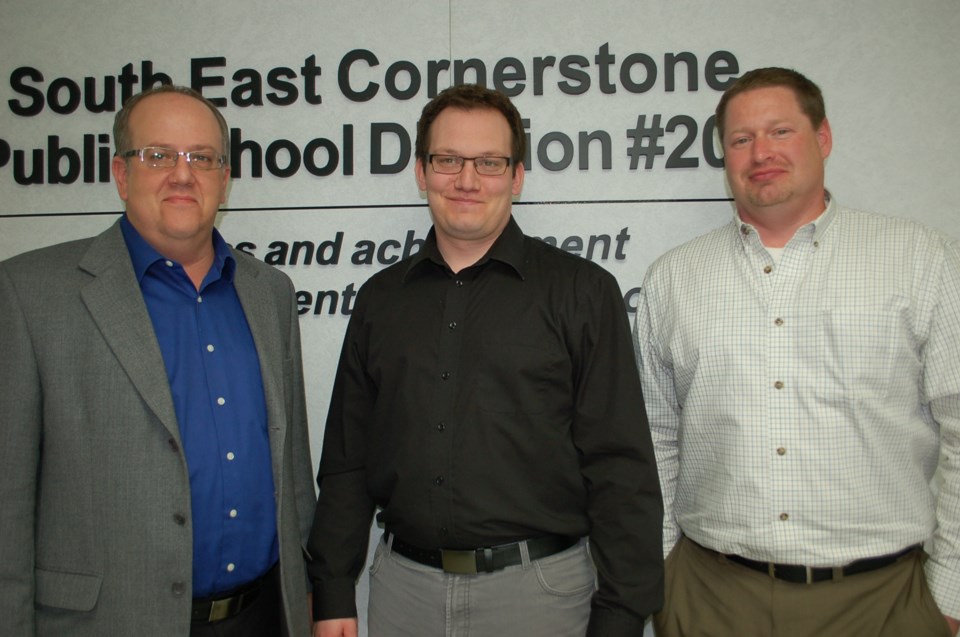The leaders of Estevan and Weyburn's commercial and industrial communities paid a visit to the South East Cornerstone Public School Division's board room on May 15 to discuss mutual concerns regarding initiatives for students who are getting ready to enter the work force.
Michel Cyrenne and Jeff Richards, executive directors of the Estevan and Weyburn Chambers of Commerce respectively, were joined by Dan Hardem, career services consultant for the school division, at the meeting with the Cornerstone board of trustees and administration.
Dion McGrath, CEO and president of the Southeast Regional College, was also pegged to be in attendance but was unable to attend due to previous job-related commitments.
The newly coined Southeast Education and Industry Council has completed an 18-month-long round of discussions and planning, and are now prepared to enter into an action plan.
The trio was introduced by Cornerstone's director of education, Marc Casavant, who provided a background into how the discussions began with exploratory talks with each of the individual organizations about getting together to form some job readiness programs for students who are wanting to transition into the workplace and meet the needs of employers.
He said there were five key components to the strategy starting with dual credits and then including job and trade fairs, work experience opportunities, career education initiatives and basic education programs.
The dual credit plan would enable students to take post-secondary courses primarily at the foundation level which can be applied toward high school graduation credits as well as gaining credits towards a certificate, diploma or degree at a post-secondary institution.
Cornerstone has just recently entered into a partnership with Assiniboia College in Brandon, Man., that will see Assiniboia accept accredited students with vocational education experience and training from Cornerstone high schools and issue them credits toward their certification and diploma programs.
Casavant said the goal is to see Saskatchewan post-secondary institutions such as the Southeast Regional College also get to a similar position.
The director also pointed out how the current housing situation in Estevan is preventing the Saskatchewan Energy Training Institute from achieving full efficiency in its training programs and that McGrath is currently in discussions with City of Estevan officials regarding the possible construction of a dormitory-like apartment complex near the SETI site.
Casavant said the closer the businesses can connect to the school, the better off all will be, and that would include the businesses making presentations in the schools to talk about their professional requirements.
"They also need information about basic employment skills, even simple things like calling in sick. A lot of kids don't even realize that if they are employed in a business, they need to report to the business, even if they are sick. They don't know a lot of things that are required in a standard work place environment."
Richards added that this situation is compounded with the youngest members of the work force now 14 years of age.
Cyrenne said in the Estevan area, the availability of labour remains the top issue and has been in the Energy City for the past six years.
"We need to tap into internships and have them transition into the workplace from school so they can become better employees more quickly," Cyrenne said. By inviting businesses into the schools, the business leaders can inform the students as to what they want and what they don't want them to do.
"What does the business community want out of the student population? What do they want to do after schooling and what can they do to enter it with some first-hand skills, something they can offer the business on day one?" Cyrenne added.
By getting employment-ready at a high school level, students are able to shorten up their college or university times, which means cost-savings for families.
Hardem said when needs are identified through trade fairs, students can better focus on their future plans. He said the Estevan trade fair this past fall attracted more than 150 senior high school students, including those from rural-based schools.
"Dual credits are a huge opportunity, a huge advantage. Skills such as welding, for instance, can be recognized by another institution. When a student can show them what they've already learned, it should be credited and right now Assiniboia College is the only one (nearby) to issue these credits."
Hardem also pointed to the cost-saving and transition-to-workplace efficiencies that can be realized through dual credit programs.
Cornerstone board chairman Harold Laich also pointed out there was still a relatively untapped labour force to be found within the First Nations and Metis communities, and if work-ready training programs could be brought closer to their homes, it would serve the region and the province well.




